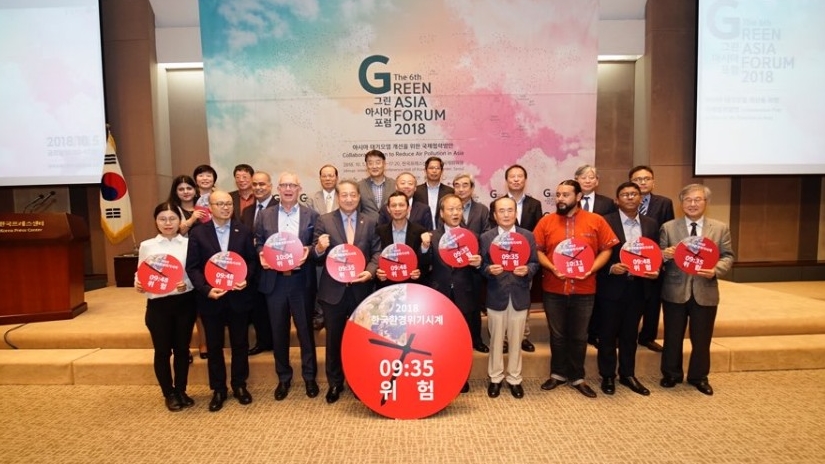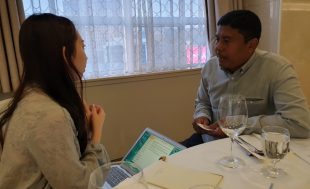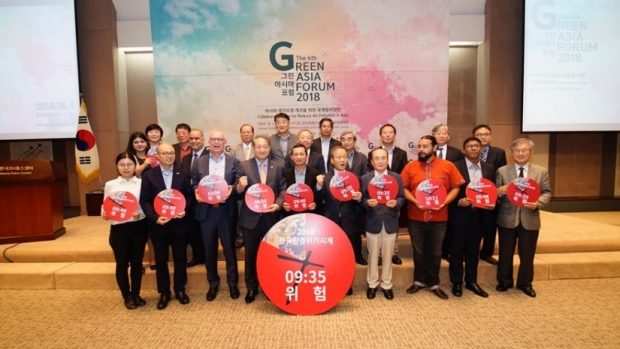
Myint Zaw: one of the many shinning stars at 2018’s Green Asia Forum
The first week of October is a special week for international environmental activists: it is the week of the annual Green Asia Forum. The Green Asia Forum was launched by Korea Green Foundation in 2012, as parts of the foundation’s continuous efforts to uphold the dream of Green Asia.
It was started in Asia as joint efforts of the winners of the Goldman Environmental Prize, a prize awarded annually to grassroots environmental activists, to join hands in tackling environmental issues. This year’s forum was participated by Goldman prize receivers Rudi Putra of Indonesia, Myint Zaw of Myanmar, Nguy Thi Khanh of Vietnam, Mark Lopez of the U.S., and Edwin Gariguez of the Philippines, along with environmental professionals such as Bernd Dallmann, chairman of Europe Environment Foundation, and Kazuhiko Sakamoto, president of Asia Center for Air Pollution Research(ACAP). Among the many Goldman Prize winners one man stood out to me the most: He is Myint Zaw of Myanmar.
Myint Zaw the co-founder of Ju Foundation and 2015 Goldman Prize winner fought for the environment to an extent that ordinary people can not imagine. Faced with government surveillance, e-mail, and restrictions on social media use, Myint Zaw began a campaign to stop construction of the Myitsone dam on the Irrawaddy River in Myanmar.
After bloody repression of the civil uprisings in 1988, Myanmar was isolated from countries around the world. Extraction of natural resources for the benefit of neighboring countries and local communities has been a hallmark of the dominant military regime for many years.
The development included a 6,000-megawatt hydropower project proposed by a Chinese state-run dam developer. The dam, scheduled to be built on the main stream of the Irrawaddy River, would displace 18,000 people in the nearby 50 villages and destroy their cultural center. It would also destroy the biodiversity of the region while putting millions of people at risk. However, the majority of the produced energy would be consumed by China and would not satisfy the energy needs of Myanmar. With my opportunities as the interviewer, I was able to ask for deeper insight:

Q: “Mr. Zaw, if the dam was to be built solely for supplying energy for Myanmar instead of China, would you have still fought against the dam project?”
A: “Yes, I would have still sternly opposed the dam project. The principle reason why I protested against the Chinese dam project was not because of power sharing with China. It was solely because of the environmental damage it would cause and the displacement of civilians.”
As journalist and social activist who grew up in the Irrawaddy River delta, Zaw spent his childhood swimming and climbing neighboring mountains. His childhood showed him the importance of the natural environment as a major source of drinking water and food in a country where more than 70% of the population live in rural areas.
Myint Zaw’s childhood experience planted the seeds for his future as a journalist in the field of the environment. Contrary to politics which was under strict influence from the media under government censorship, environmental issues seemed to allow conversations that solved social issues to bring about positive changes.
After studying in Thailand and the United States, Myint Zaw returned to Myanmar in 2008 and witnessed the destruction caused by Cyclone Nargis. He created a group with the initial goal of bringing humanitarian relief. However, as a journalist, he saw the power of storytelling that links the grassroots movement with the health of the environment, accelerating recovery in the aftermath of the disaster.
In 2009, the Myitsone Dam became a major issue, moving the focus of Myint Zaw’s group to raising environmental awareness.
Q: “Mr. Zaw, you have said to have witnessed the power of grassroots movement. In your opinion, which is more important: influencing politics or grassroots mobilization?”
A: “I can not possibly say that one is more important than the other because it is like the issue of whether the chicken comes before the eggs. Grassroots movements must grow so that they become inevitably influential to legislators, who then will influence policy. But at the same time, growth and development of grassroots movements is difficult without the help of policy makers who make space for citizen and activist participation in politics.”
Myint Zaw became the center of the public awareness campaign on the importance of the dam and the Irrawaddy River. He created art pavilions – a strategic choice to use galleries as a few places for activists, scholars, artists, and citizens to avoid government scrutiny.
The goal was to inform people about the environment, social and cultural importance of the river and that Myanmar would be lost due to the dam. In order to show originality and sincerity, Myint Zaw and his colleagues went to a country lacking technology, infrastructure and is subject to government restrictions. Access to email and social media was also very difficult. *Despite the harsh punishment of writers in unauthorized publications, he and his colleagues risked printing and sharing information without submitting it to the government. The series of art exhibitions turned into nationalistic movements by people spontaneously talking about raising awareness of the problem. Artists wrote poems and songs about the river, and citizens distributed DVDs and pamphlets about the dam.
Q: “I was most inspired by the idea that your movement was powered by printed paper, songs, poems instead of mediums such as social media. Why do you believe that this method was more powerful than social media, which many people believe is capable of accessing a wider group of audience?”
A: “Aside from the fact that social media was still in the process of developing at that time in Myanmar, I believe that artistic messages have the power to touch upon each individual’s soul. Art and culture is something that all people of Myanmar share. By touching upon this bond, we are a touching on people’s sense of love and duty for our country, causing them to be more responsible for the environment too.”
The movement soon attracted the interest of local lawmakers and local media, which have secured the ability to deal with social problems since the new government in 2011. The campaign raised questions about the long-term environmental and social impacts of dams and external investment, reaching high-ranking government officials, including the president.In 2011, President Thein Sein vowed that the project would not continue as long as he ceased construction of the dam and ruled, as many see it as evidence of hope for the new democracy and environmental movement in Myanmar. As China’s investment expands rapidly overseas, this case provides a very important example of what happens when the government develops independently, without debate with the citizens.
Q: “Mr. Zaw, many people believe that sometimes, environmental alteration is to an extent necessary for social development. To what extent do you think is impacting the environment for development necessary?”
A: “I believe that social development goes hand in hand with environmental preservation. The well being of the people depend on the state of the environment and there can not be long time development without a clean environment.”
Q: “Finally, South Korea has joined the ranks of the world’s most polluted countries. However, often times grassroots movement or protests do not lead to political changes such as your case when your movement reached legislators and the president who finally prevented the dam construction. What advice do you give to Korean environmental groups to improve their communication with policy makers?”
A: “I think the link between activists and policy-makers is always a difficult issue in any country. The most important way for activists is to mobilize and strengthen their grassroots movement and share a common goal of environmental protection so that the government can not possibly turn a blind eye on the rising movement.”
By YeJi Chun, Seoul International School



